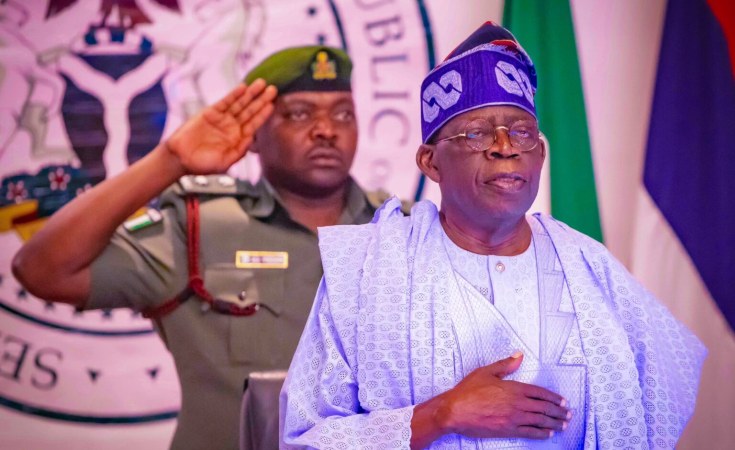The federal government has reduced the deficit in the 2024 budget to below 3.8 percent of Gross Domestic Product (GDP), thereby reducing the reliance on borrowing.
This was disclosed yesterday by minister of finance and coordinating minister of the economy, Wale Edun, after President Bola Tinubu signed the 2024 Appropriation Bill into law in keeping with his avowed commitment to maintaining a timeous, predictable and efficient budget cycle.
Tinubu assented to the bill at the State House, Abuja, yesterday, shortly after returning to Abuja from Lagos.
At the ceremony, the president assured Nigerians that the implementation of the budget would be efficiently pursued and vigorously monitored, adding that all the institutional mechanisms would be deployed in ensuring diligent implementation
The president, in a statement by presidential spokesman, Ajuri Ngelale, said, "All MDAs have been directed to take responsibility and provide monthly Budget Performance Reports to the Ministry of Budget and Economic Planning, which in turn shall ensure the veracity of such.
"The minister of finance and coordinating minister of the economy shall hold regular reviews with the Economic Management Team and, in addition, I shall chair periodic Economic Coordination Council meetings," he said.
The top priorities of the 2024 budget of N28.7 trillion are defence and internal security, job creation, macro-economic stability, improved investment environment, human capital development, poverty reduction, and social security.
The president emphasised that his commitment to enhance investment promotion while creating a rules-based society that favours no individual over the law begins with important reforms in the Nigerian judiciary, the funding for which is captured in the 2024 Appropriation Act.
"Funding the judiciary is a major element in our effort to support a just, rules-based society. Statutory transfer to the Judiciary has been increased from N165 billion to N342 billion," the president said.
Some of the key estimates are capital expenditure, N10 trillion; recurrent expenditure, N8.8 trillion; debt service, N8.2 trillion, and statutory transfers, N1.7 trillion.
Edun explained that the budget deficit is lower at 3.8 percent of GDP, reducing the reliance on borrowing, with improvements in revenue generation using technology and digitalisation to also boost funding.
He said, "But overall, the change in this budget is that it is focused on growing the economy. The capital expenditure is larger than the recurrent expenditure; over N10 trillion is going to be the capital expenditure, while recurrent is just about N8.8 trillion.
"I think that shows the direction of travel. It shows that we can expect an economy rejuvenated, re-galvanized and set for growth."
Asked how optimistic is the government on getting the finances to meet this budget, he said, "The first thing to say is that it's a lower budget deficit, so it's a lower financing requirement and, in fact, as a percentage of GDP, the budget deficit is down from 6.1% to 3.8%.
"So, we're relying less on borrowing and more on revenue and I think you have to take the two together. I think we're very optimistic about the improvements in revenue that will take place.
"We are all ready, even from tomorrow, applying technology and digitalisation to ensure that the revenue that should come to government from all sources, including from government-owned enterprises, comes into the consolidated revenue fund, and on the other side, we are bringing order to government borrowing, so Ways and Means is being eliminated by taking the funding that is required from the market, as opposed to from printing of money by Central Bank.
"That, in a nutshell, is what is happening on the financing side. We are very optimistic that not only will this budget be funded adequately, but it will be funded on a timely basis as well," he said.
The Senate President Godswill Akpabio, and Speaker of the House of Representatives, Hon. Tajudeen Abbas, were present at the signing.
Other senior government officials present at the brief ceremony include: minister of finance and coordinating minister of the economy, Wale Edun; chief of staff to the president, Femi Gbajabiamila; minister of budget and economic planning, Senator Atiku Bagudu, and national security adviser, Nuhu Ribadu.
Akpabio praised the "expeditious manner" in which the National Assembly treated the budget and noted that the budget increased slightly from N27 trillion to N28 trillion in order to address human capital development and security concerns.
Akpabio said returning to a January-December budget cycle for the first time since 2018 was a sacrifice for national development.
He commended Tinubu for cutting short his holiday to sign the budget on the first day of the new year.
The Senate president vowed that the National Assembly (NASS) would rigorously oversee the implementation of the budget.
He said lawmakers from both chambers collaborated closely during the budget defence process, and will undertake joint monitoring going forward.
Akpabio remarked that President Tinubu had instructed ministers and agency heads to provide monthly progress reports, warning that underperformers will be removed.
"Ours is to ensure we monitor what goes on to ensure the budget is fully implemented," Akpabio stated.
Minister of Budget and Economic Planning Atiku Bagudu said the budget priorities include human capital development, education, health, infrastructure, innovation and science.
Meanwhile, the Speaker of the House of Representatives, Tajudeen Abbas, has declared that the new budget has ended controversial borrowing practices that have plagued past administrations.
Abbas praised the move, saying it has effectively brought to an end the controversial ways and means of borrowing money.
The speaker said President Tinubu also signed a 90-day extension of the 2023 supplementary appropriations bill, allowing it to operate concurrently with the new 2024 budget until March 31st.


